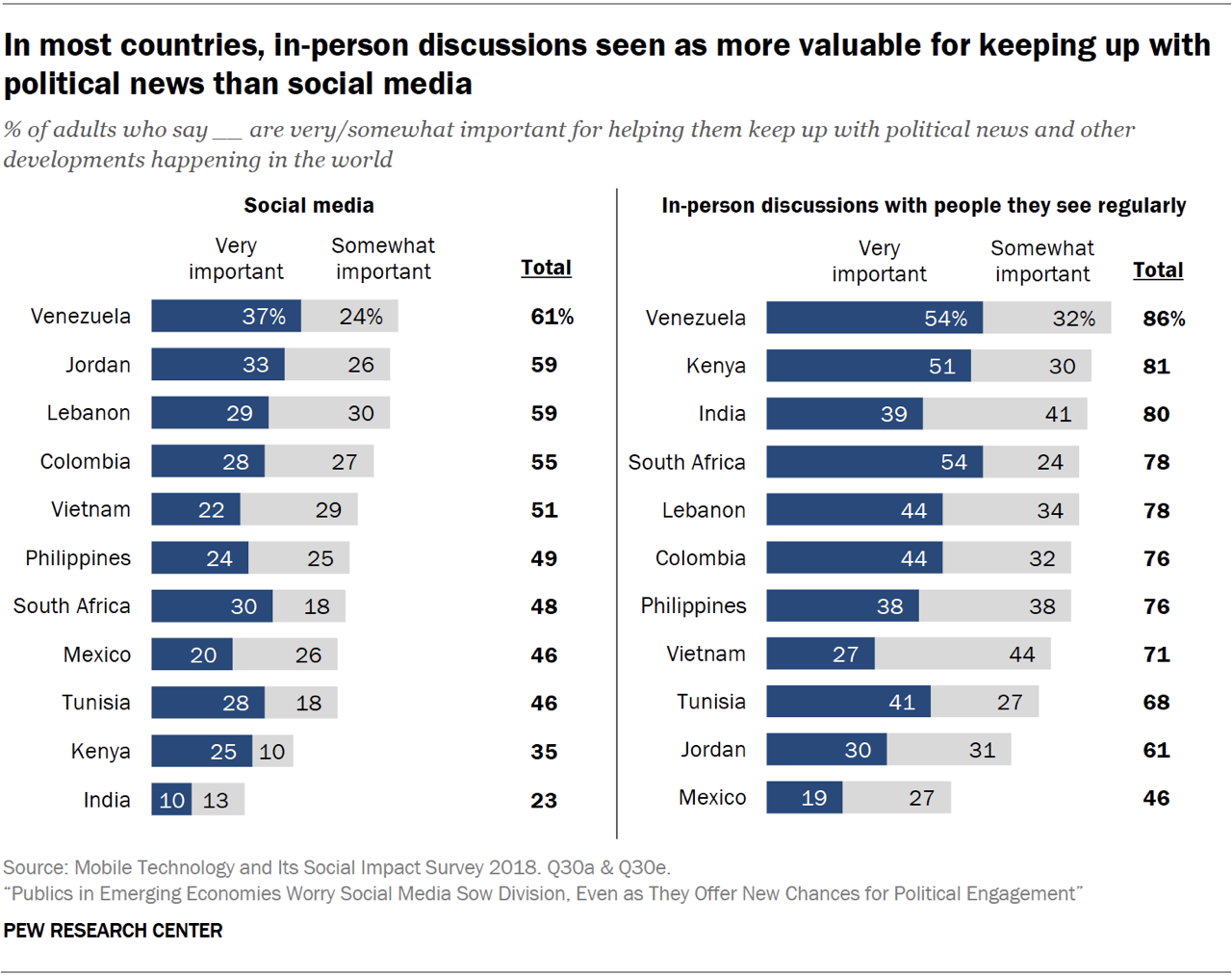
Social media use has increased in emerging and developing nations in recent years. And, across the 11 emerging economies surveyed for this report, a median of 28% of adults say social media are very important for helping them keep up with political news and other developments happening in the world.
At the same time, opinions are divided when it comes to the reliability, bias and hateful nature of social media content when compared with other sources. And when asked about the kinds of material they encounter on these sites, majorities in most countries report at least occasionally seeing content that seems obviously false or untrue or that makes them feel negatively about groups different from them. Across almost all these measures, those who say social media are very important sources of political information see these platforms in different – and often more extreme – terms than other social media users.
Even as social media use has become more common in many emerging countries, in only four of the 11 countries surveyed do a majority of people say these platforms are an important source of political information – and nowhere does a majority say social media are very important for learning about politics. All told, a median of 28% of adults say social media are very important for helping them keep up with political news and other developments happening in the world.
In every country, many fewer people say social media are very important for helping them keep up with political events than say the same about a more traditional form of social networking – having discussions in person with people they see regularly. In every country but Mexico, a majority says in-person discussions are an important way they stay informed. Around four-in-ten or more in most countries say these conversations are very important.

Some of the reason people place less importance on social media might stem from the fact that social media use can vary widely across these 11 countries – from a low of 31% in India to a high of 85% in Lebanon. But even among those who use these platforms, only in four of the 11 countries surveyed (South Africa, Tunisia, Venezuela and Kenya) do about half or more social media users say these platforms are very important sources for helping them keep up with political news and global happenings.
In every country, younger and more educated people are more likely to say social media are very important to them for political news. 5 However, in many instances this is largely due to high levels of social media adoption among the young and more educated. Among those who say they use social media, people with higher and lower levels of education are equally likely to say these platforms are a very important source of political news in seven of these 11 countries, and the same is true of older and younger social media users in six countries.
If you haven’t watched the news today, at least you can still watch it on Facebook. MAN, 40, PHILIPPINES
MAN, 40, PHILIPPINES
More broadly, relatively few adults in these countries say they trust the information they get from social media platforms. Among all adults, a median of 35% trust the political news they get on social media, including a median of just 10% who trust it a great deal. Among the subset of adults in these countries who use social media, an 11-country median of 55% say they trust the information they find on social media at least somewhat – ranging from highs of about seven-in-ten in the Philippines, Kenya, India and Venezuela to lows of less than half in Colombia and Mexico. Few users in most countries trust the news they get on social media a great deal – varying from only 8% of Jordanian social media users to 31% of Kenyan users.
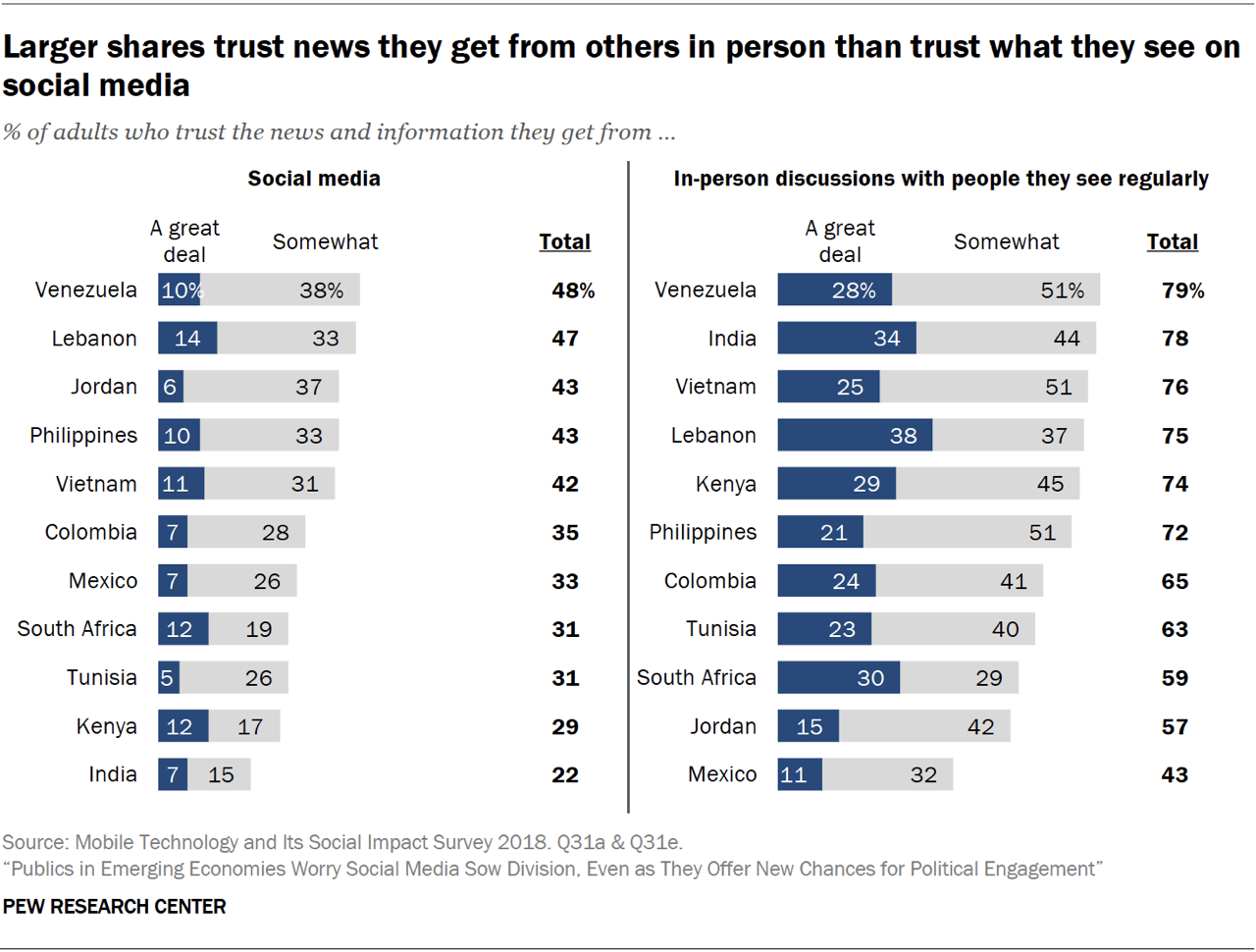 those who trust what they see on social media." width="1280" height="970" />
those who trust what they see on social media." width="1280" height="970" />
These levels of trust stand out in comparison with the faith people place in the information they gather from face-to-face conversations with people they see regularly. When it comes to in-person conversations, a median of 72% of adults say they trust the information they glean from these discussions, and in eight countries, around a quarter or more say they trust the information a great deal.
Social media users report a mix of positive and negative experiences related to the content they see on these platforms. This survey asked about the frequency with which people encounter three specific types of content on social media: content that introduces them to new ideas, that seems obviously false or untrue, or that makes them feel negatively about groups of people who are different from them. Although in no country do a majority of social media users see any of these types of content frequently, in many countries a majority reports seeing all of them at least occasionally.
A median of three-quarters of social media platform and messaging app users say they frequently or occasionally see articles or other content that introduce them to a new idea, ranging from more than eight-in-ten in Tunisia to about half in Mexico. Smaller shares see this content frequently – around four-in-ten or fewer in most countries.
Publics are more likely to say they regularly see content that introduces them to a new idea than to say they regularly see content that seems obviously false or untrue, or that provokes negative feelings toward others. Still, majorities of social media users in most countries surveyed see both at least occasionally, including about two-thirds or more in Tunisia, Lebanon and Vietnam. And very few social media users say they never see content like this: A median of 17% of social media users report never seeing articles that make them feel negatively toward groups of people different from them, and just 8% never see content that appears to be obviously false or untrue.
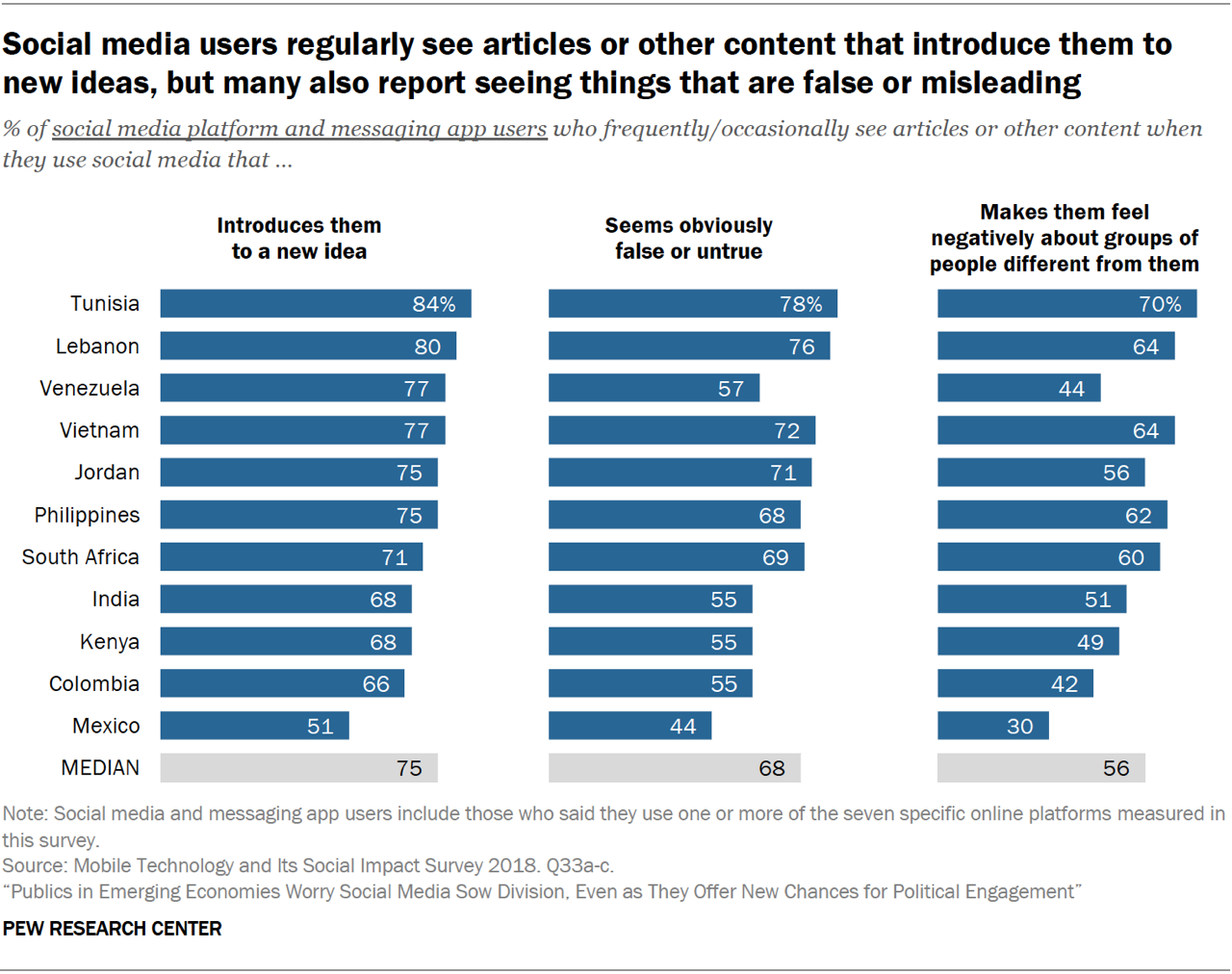
Social media users who access more than one platform are more likely than those who just use a single platform to come across all three kinds of content. The differences are especially large in Lebanon: 83% of Lebanese who access multiple social media sites regularly see articles that seem obviously false or untrue, compared with only about half (48%) of those who use a single site. In Tunisia, on the other hand, access to multiple platforms is not linked with someone’s likelihood of coming across these kinds of content.
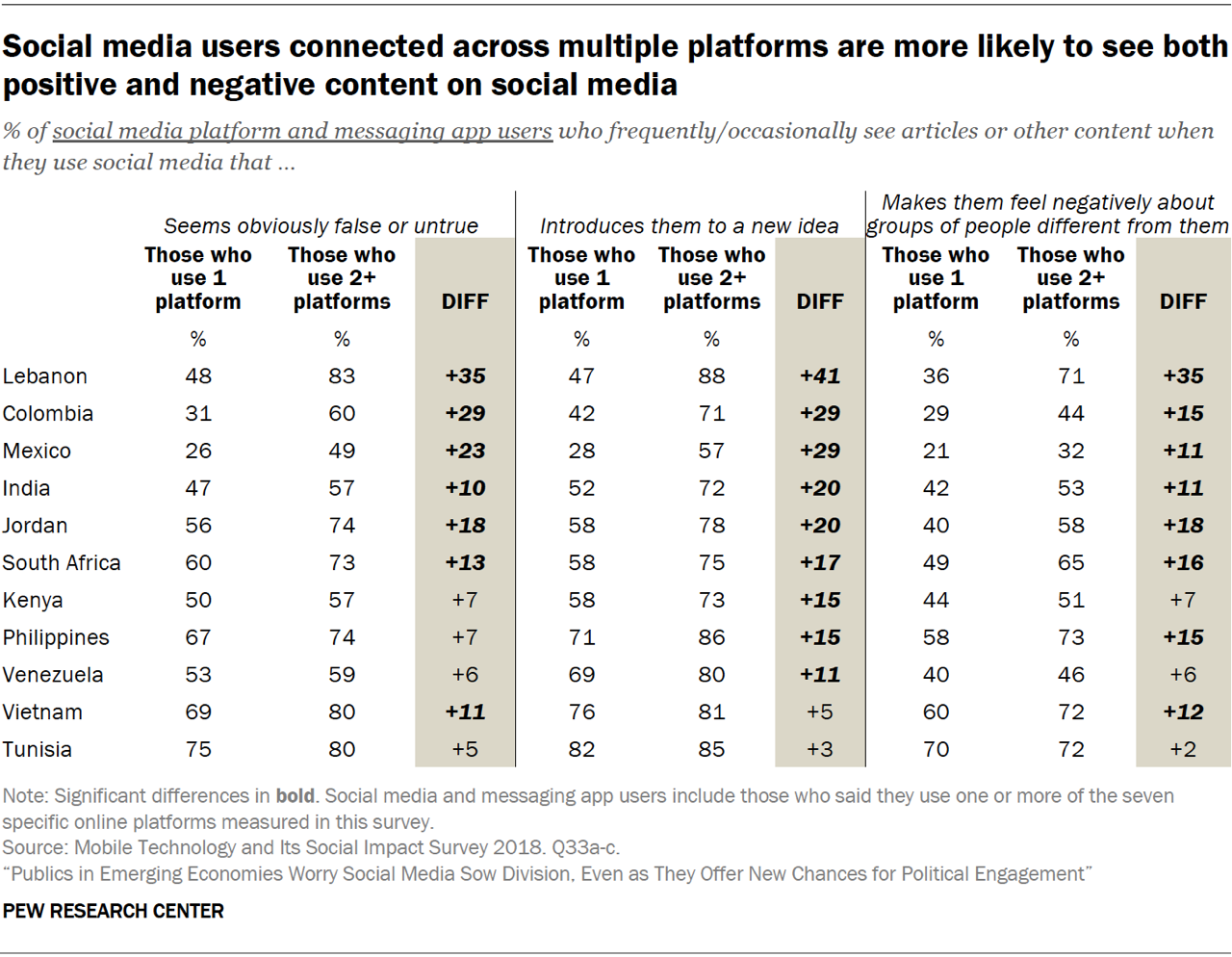
These differences in platform use are themselves related to social media users’ age and education. Older and less educated social media users are more likely to use only one site, while younger and more educated users are more likely to use many. Consequently, younger and more educated social media users are generally more likely to encounter all kinds of content than older and less educated users.
It’s bad enough that websites like Facebook already cocoon users because the author serves you information that he thinks you want to see and hear, based on what you’ve already seen and heard …. Now we learn on top of this, the information may not be true. MAN, 25, PHILIPPINES
MAN, 25, PHILIPPINES
In addition to encountering a mix of positive and negative content on these platforms, social media users in these countries also have mixed opinions about the nature of what they see on social media relative to other information sources. In most countries, larger shares say these social media platforms are more up to date, informative and focused on issues that are personally important to them. But there is much more disagreement over whether these platforms are more reliable, hateful or biased than other information sources.
Pluralities of social media users in most countries surveyed say social media are more informative and focused on issues important to them compared with other sources: Six-in-ten or more in Lebanon and Vietnam say these platforms are more informative, while about half say the same in Venezuela, South Africa, Tunisia and the Philippines. But Mexicans and Colombians take a different view. In these countries, only about a quarter of social media users say these platforms are more informative than other sources, with roughly half saying they are similarly informative.
[Facebook] identifies you and it sends you whatever you like the most. The information is more precise and it corresponds to your personality. WOMAN, 34, MEXICO
WOMAN, 34, MEXICO
Meanwhile, in no country does a majority say the news and information they get on social media is more focused on issues important to them compared with other sources. Instead, many say the news they get on social media is about as focused on issues they care about as other sources, if not less so. Half of Colombian social media users, for example, say the news and information they get on social media is about as focused on issues that are important to them as the news they get elsewhere. And about four-in-ten Kenyan users feel it is less focused on personally relevant issues.
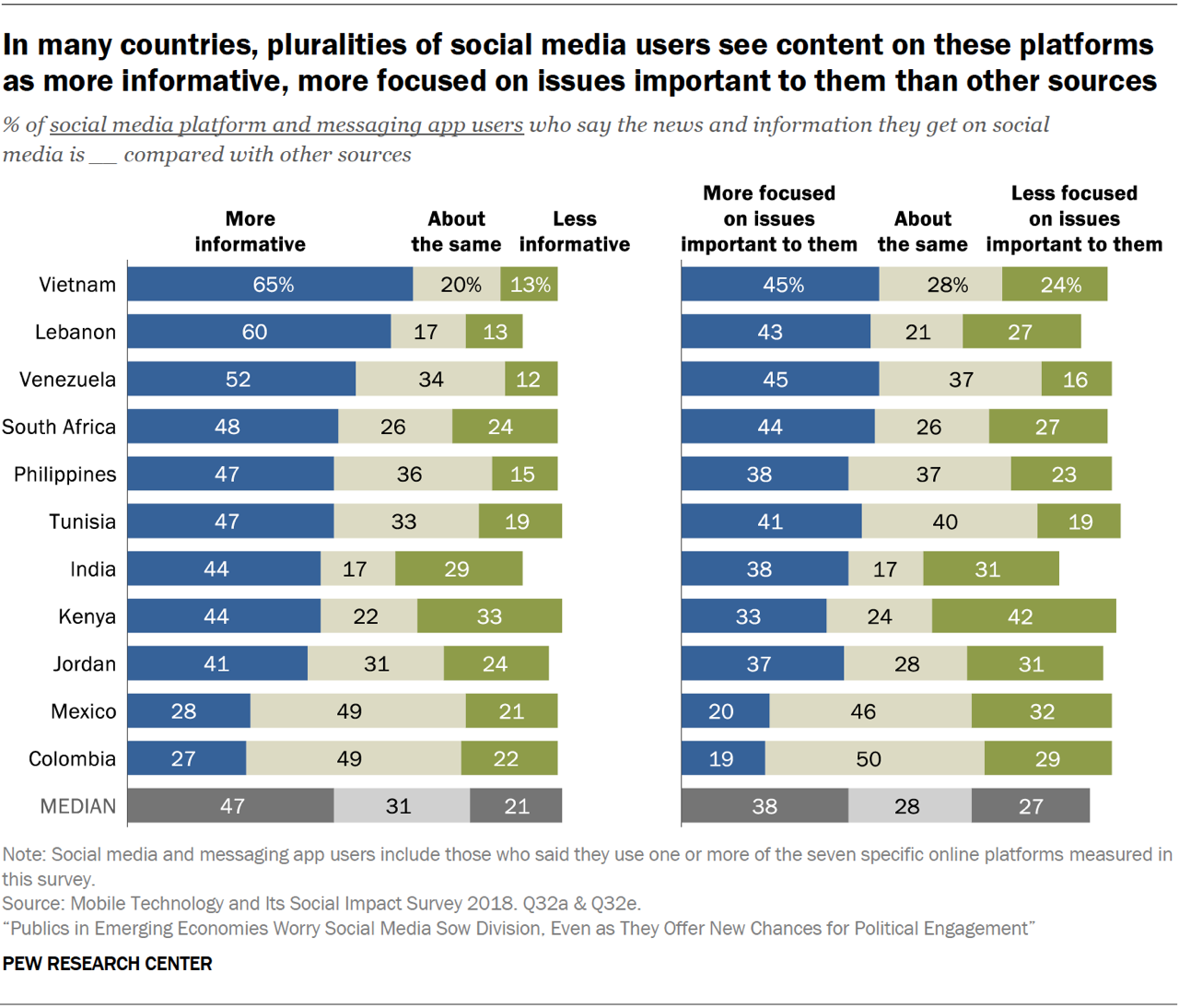
These views are closely related to one another. In every country surveyed, social media users who feel these platforms deliver content that is more personally relevant than other sources are also more likely to say social media are more informative – and the reverse is also true.
In most countries, about half or more social media users say the content they get from social media is more up to date than what they get from other sources. Jordanians, Lebanese, Venezuelans and Vietnamese are especially likely to rate social media as more up to date than other sources, while Colombians are least likely to do so.
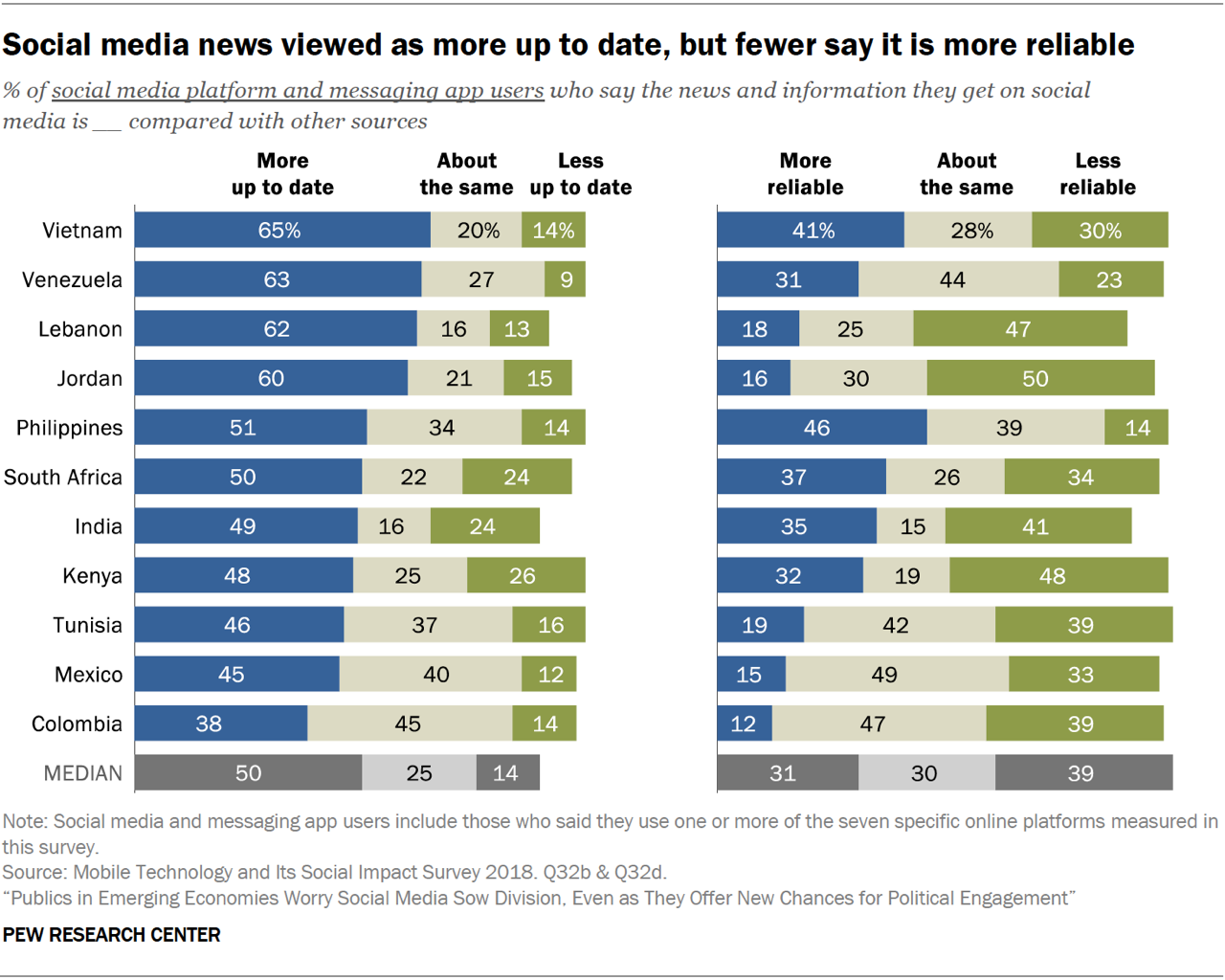
When I compare social media and the media houses, the media houses are more reliable … on social media you find some bloggers who are conveying false information and false news just to hurt other people, or to just lie. MAN, 26, KENYA
MAN, 26, KENYA
By contrast, in each of the 11 countries surveyed, smaller shares say the news and information they get on social media is more reliable than what they get elsewhere. But although relatively few think social media are more reliable than other sources, in no country does a majority think social media are less reliable. Instead, many say that social media are about as reliable as other sources. Only in the Philippines and Vietnam does the largest share of users view these platforms as more reliable than other sources.
In addition, individuals who rate social media positively in one of these respects are also more likely to rate it positively in the other. Those who say the news and information on social media is more up to date are also more likely to say it is more reliable, and vice versa. Consider South Africa: More than half of South Africans (53%) who say social media news is more up to date also say it is more reliable than other sources, and a majority of South Africans who say it is less up to date (55%) say it is less reliable than other sources.

Social media users have mixed views when it comes to the degree of bias they see on social media. Pluralities in five countries – Colombia, Mexico, the Philippines, Venezuela and Tunisia – view content on social media as comparably biased to what they get elsewhere. But in other countries, the balance of sentiment points in different directions: A plurality of Indian and Lebanese social media users say social media content is more biased, while a plurality of Kenyan users say it is less biased.
There is also a nearly even split across countries in people’s views of how hateful the news and information on social media is. A median of 31% say social media content is more hateful than content from other sources, while 30% say it is less hateful and 34% say they are about the same. Four-in-ten or more Lebanese and Colombians see more hateful content on social media than elsewhere, while similar shares of Kenyans and Vietnamese see less.
As with assessments of the timeliness and reliability of social media, views of bias and hatefulness also go together. People who say social media are more biased than other sources are more likely to say these sources are more hateful, and vice-versa.
Before and during the election, there was incitement and violence and social media fueled this. … But the same social media brings togetherness and peace in this country. MAN, 26, KENYA
MAN, 26, KENYA
These attitudes vary only modestly by age and educational attainment. Larger shares of social media users with a secondary education or more say social media are more biased and hateful than other sources in Colombia, India and Mexico, but these assessments do not vary by educational attainment in the other countries surveyed. And age-related differences are even less common. Only in Mexico, Kenya and Vietnam do those ages 50 and older and those under 30 differ in their views of the bias on social media, and only in India do they differ when it comes to hatefulness.
Across many of these attributes, those who say social media are very important for helping them get political information stand apart from social media users who do not say these platforms are very important political news sources. They are more likely than other social media users to call the news and information they get on social media more informative, timely, reliable and focused on issues important to them than other users in every country but Venezuela. In eight countries, they are more likely to call the information they get from social media more biased compared with other sources. But when it comes to the potentially hateful nature of news on social media, in most countries, social media users tend to view news on these platforms in similar terms.
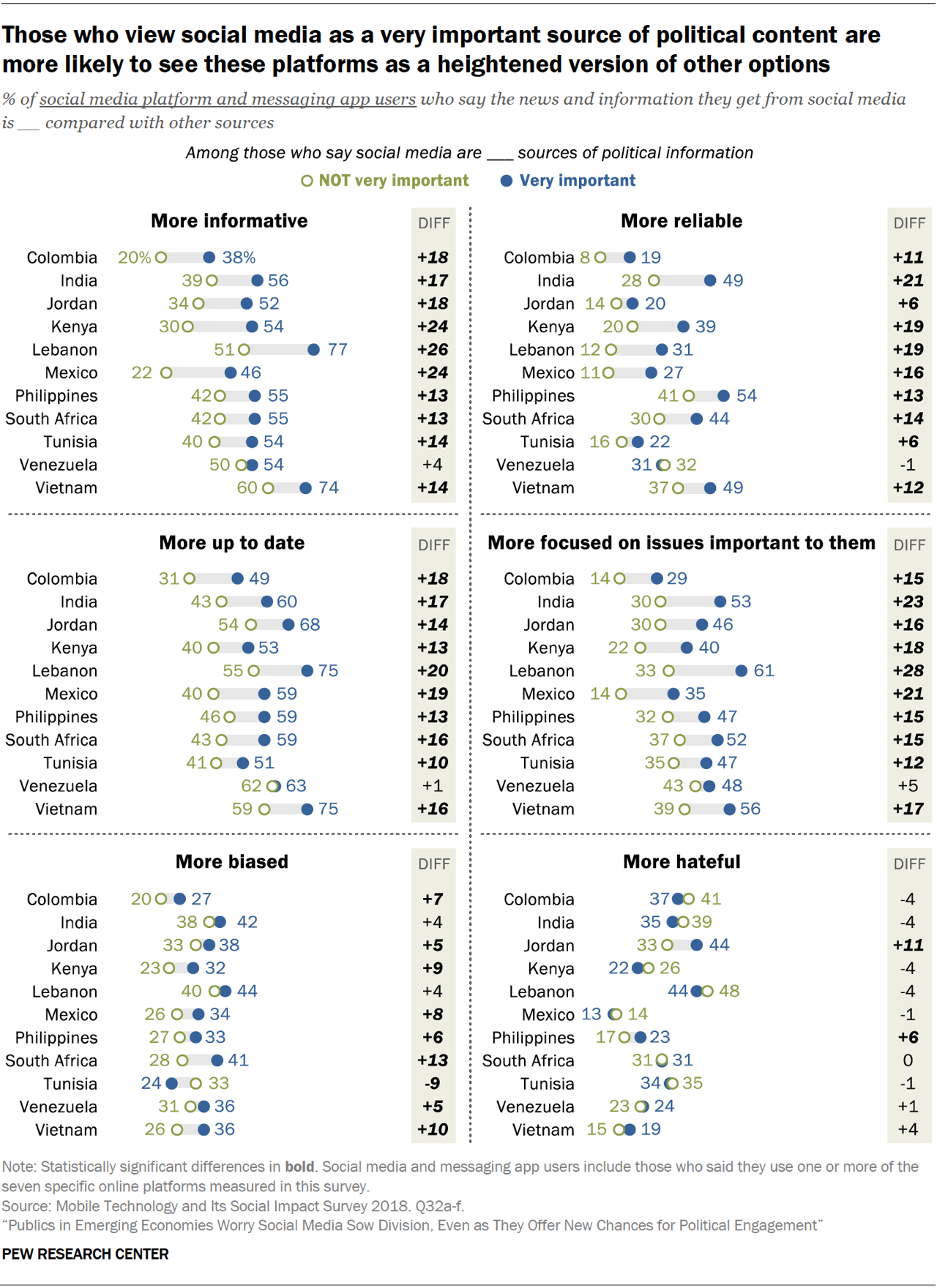
Fresh data delivery Saturday mornings